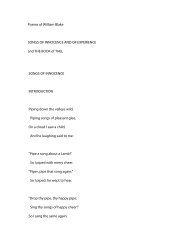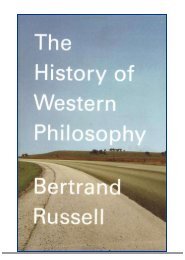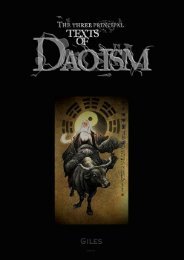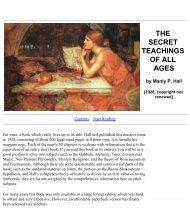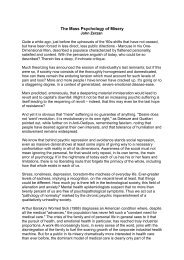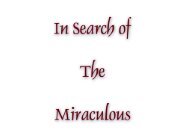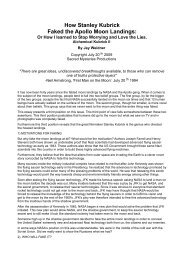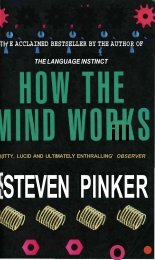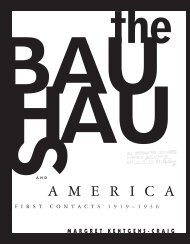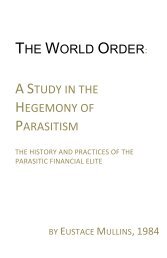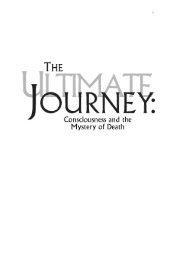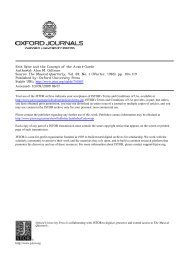At the moment when consciousness became able to account for theessence of "time," time is irrupted. <strong>The</strong> sense of "irruption" is ambiguousjust as the moments of transition are ambiguous and Janus-faced. <strong>The</strong>term "irruption" signifies both the intrusion as well as the collapse of timefor our consciousness.But what is "time"? It is more than a mere clock time which was previouslyconsidered to be reliable and constant. It is symptomatic for ourpredicament that today in the light of the most recent research evenastronomy has brought into question the constancy of clock time. <strong>The</strong>topic for discussion at a general meeting of the Swiss AstronomicalAssociation in Lausanne (Spring, 1951) was, "Is time constant?" It is in factnot constant but decreases by 5.3 seconds per century, as G. Thiercy ofthe University of Geneva Observatory has demonstrated. This resultconfirms in its own way the remark by E. Rosenstock-Huessy that we are"today laboring on a science of time" which, as he emphasizes, does notitself do justice to the trude phenomenon of time. And chronological timeis but one aspect of a more encompassing phenomenon: it is the mentalaspect of that constituent of the world which manifests itself, not as space,but as a basic phenomenon of space.In our deliberations in the fifth chapter of Part I, "<strong>The</strong> Space-TimeConstitution of the (Consciousness) Structures," we have shown that atleast three forms of time can be discerned: magic timelessness, with itsemphasis on the vital sphere; mythical temporicity with its psychicaccentuation; and mental conceptual time with its spatial accent—adeficient agent of dividing.<strong>The</strong> three-dimensional conceptual world of our fathers had no sensoriumfor the phenomenon of time. Living in a spatially frozen world, theyconsidered the temporal world to be a disturbing factor which wasrepressed, either by being ignored, or by being falsified by measurementinto a spatial component. That is to say, in the perspectival worldconceptioneverything was measured in spatial terms, including thephenomenon of time and other phenomena devoid of spatial (though notspatializing!) properties, which were reshaped by measure into spatialcomponents. For perspective-thinking man, time lacked all quality. This isthe decisive factor: he employed time only in a materialized andquantitativ sense. He lived by Galileo's maxim: "To measure everythingmeasurable, and to make everything measurable that is not yetmeasurable."This maxim—an Aristotelian axiom driven to extremes—formed theleading motif of the perspectival age. But to measure is to spatialize; andrampant measurement leads to quantification. One of the best authoritieson the theories and philosophies of the perspectival age, Werner Gent,stated that the age had declassed and degraded time to a mere numericalquantity. Stated in more precise terms: that era had perverted time bymaking it into an analytical measurable relationship and by materializingit. Because of the materialization the relationship gave rise in the course64
of the last few centuries to an extreme dualistic form of thinking whichrecognized only two antithetical and irreconcilable constituents of theworld: measurable, demonstrable things, the rational components ofscience which were valid; and the non-measurable phenomena, theirrational non-components, which were invalid.To the perspectival age time meant nothing but a system ofmeasurements or relationships between two moments. Time as a qualityor an intensity was simply not taken into account and was deemed to beonly an accidental and inessential phenomenon. Time, however, is a muchmore complex phenomenon than the mere instrumentality or accidence ofchronological time. <strong>The</strong> fact that we today still think in terms of thespatial, fixed, three-dimensional world of conceptuality is an obstacle toour realization of the more complex significance of the phenomenon.Anyone who dares to venture such a realization is accused ofterminological obfuscation. But this should not prevent us from statingthat time as a reality encompasses still other essential forms ofappearance which are proper to it alone and not to space.To the perception of the aperspectival world time appears to be the veryfundamental function, and to be of a most complex nature. It manifestsitself in accordance with a given consciousness structure and theappropriate possibility of manifestation in its various aspects as clocktime, natural time, cosmic or sidereal time; as biological duration, rhythm,meter; as mutation, discontinuity; relativity; as vital dynamics, psychicenergy (and thus in a certain sense in the form we call "soul" and the"unconscious"), and as mental dividing. It manifests itself as the unity ofpast, present, and future; as the creative principle, the power ofimagination, as work, and even as "motoricity." And along with the vital,psychic, biological, cosmic, rational, creative, sociological, and technicalaspects of time, we must include—last but not least—physical-geometricaltime which is designated as the "fourth dimension."This seemingly random enumeration of temporal aspects may bedisconcerting to someone unable to disengage himself from his threedimensionalconception of the world. To a systematician these aspects willseem to be incongruent quantities. But they are not quantities: they areelements and functionals which cannot be conceived of or arrayed inspatial terms. <strong>The</strong> apparent lack of a system that seems to prevail in ourenumeration in fact corresponds to the respective realities.What is effected can be understood systematically; but the power to effectcannot, unless we wish to perpetuate the mistakes of perspectival man byerroneously converting intensities into spatial extensities. We should alsoavoid the error of placing the "effected" into a causal relationship with the"effecting." And we should avoid the additional error of considering themin a dualistic fashion as antitheses, since this would amount to yet afurther systematization.Nor can a purely categorical mode of consideration do justice to the65
- Page 5 and 6:
deficient forms which have become a
- Page 7 and 8:
they could not reach their intent w
- Page 9 and 10:
identity, or with his being equated
- Page 11 and 12:
was especially influential on Greek
- Page 13 and 14: anticipated by Pope Sabinus, who in
- Page 16 and 17: discovery of Augustine's words. "I
- Page 18 and 19: concretion of space, our epoch is c
- Page 20 and 21: While plumbing the hidden depths of
- Page 22 and 23: With Leonardo the perspectival mean
- Page 24 and 25: perspective, had become common prop
- Page 26 and 27: not an avenue. Although man's horiz
- Page 28 and 29: order to obtain a sequential view o
- Page 30 and 31: the truly unrepresentable become ev
- Page 32 and 33: apparent in the development of aper
- Page 34 and 35: characteristics of the structures,
- Page 36 and 37: Structureaugmentation, a loss or a
- Page 38 and 39: "silenced music" of which St. John
- Page 40 and 41: meantime the integral perception an
- Page 42 and 43: homogeneity of the viscera, as well
- Page 44 and 45: Archaic — OriginaryMagicempathy a
- Page 46 and 47: IntegralCreed)Method(Divinity)(Eteo
- Page 48 and 49: that structure itself. Orestes' act
- Page 50 and 51: in its silent meaning, for he dedic
- Page 52 and 53: directed way, and to a mythical dem
- Page 54 and 55: Even though we may be unable to do
- Page 56 and 57: of arational possibilities which ar
- Page 58 and 59: chapters 5, 6, and 7, we would like
- Page 60 and 61: presupposes in any event the mental
- Page 62 and 63: capability is being formed in him w
- Page 66 and 67: temporal aspects enumerated. We are
- Page 68 and 69: understanding the phenomenon of tim
- Page 70 and 71: temporal forms which co-constitute
- Page 72 and 73: crystallizing in a new perception o
- Page 74 and 75: dream-like and somnolent aspects an
- Page 76 and 77: ealization now manifesting itself a



